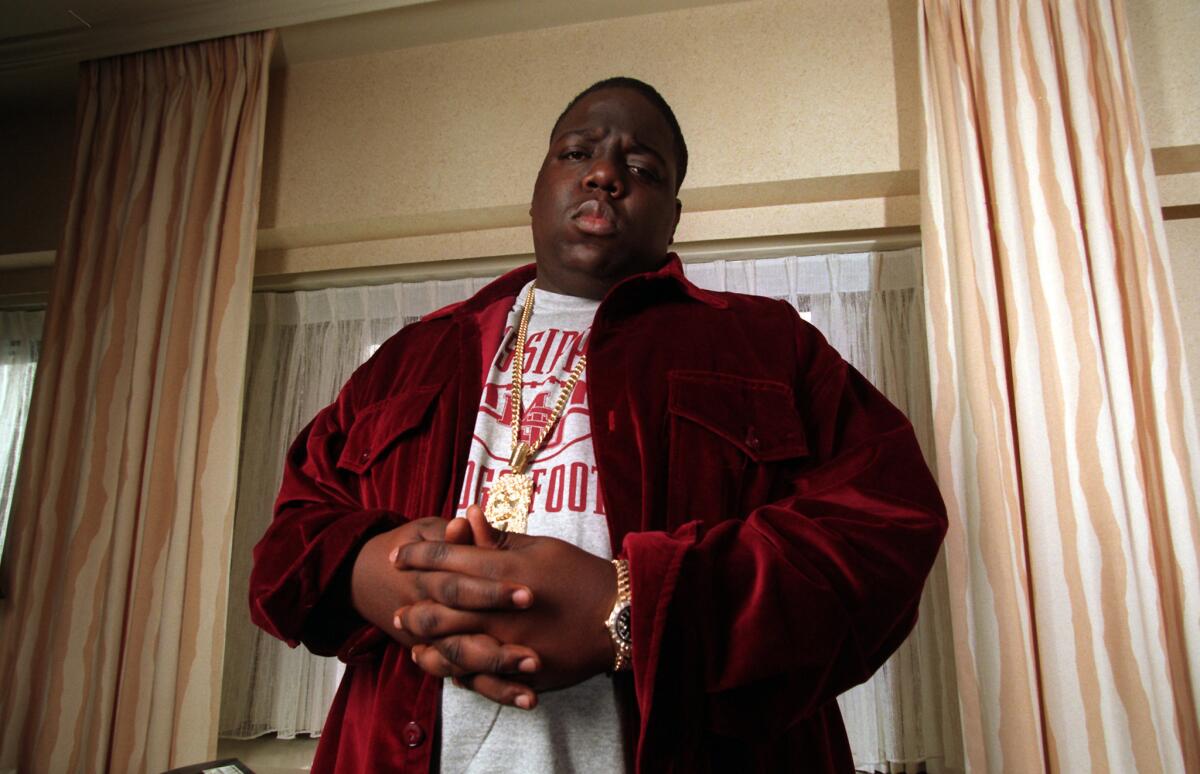The Notorious B.I.G. (Christopher George Latore Wallace; Biggie Smalls; Biggie) (May 21, 1972, New York – March 9, 1997, Los Angeles) was an American rapper and producer, and one of the leading figures of the Bad Boy Records label. In 1995, he was named Rapper of the Year by the Billboard Music Awards.
His mother, Voletta Wallace, a Jamaican immigrant, was a school teacher, and his father, Selwyn George Latore, was a welder and later a politician. In 1974, his father left the family, forcing Voletta to work multiple jobs to support her son. Biggie spent most of his life in the Bronx, a New York borough plagued by unemployment, social inequality, and crime. As he grew up, Wallace faced many hardships, including his mother’s cancer diagnosis, his girlfriend’s early pregnancy, and poverty, which led him to drug dealing. His entry into the criminal world resulted in several arrests for possession of weapons and narcotics. These experiences inspired his rap lyrics and formed the basis of his stage persona. Wallace claimed that writing lyrics was his way of surviving.
His debut album, Ready to Die (1994), brought him both critical and commercial success. Critics noted that Wallace recreated the sonic landscape of his world with stunning clarity (Lang, 2007). His natural delivery, use of unconventional sounds, and conceptual approach to the album set him apart from other rappers. The success attracted media attention and allowed him to tour nationwide.
The album’s content dealt with Wallace’s criminal activities, including drug acquisition, packaging, and resale, accompanied by reflections on his growing fame, which posed new dangers to his life. Death was a central theme of Ready to Die, culminating in the lyrical protagonist’s suicide. Despite the tragic ending, Wallace sought to inspire hope and resilience through his music.
Notorious B.I.G.’s emergence helped East Coast rappers reclaim dominance in hip-hop, which had been led by the West Coast since the late 1980s. His gritty storytelling contrasted the West’s glamorized narratives of luxury life popularized by Dr. Dre, Snoop Dogg, Ice Cube, and others. His success contributed to the rise of Bad Boy Records, one of the most commercially successful labels whose influence extended beyond hip-hop. Wallace also mentored future stars like Lil’ Kim and Junior M.A.F.I.A.
Wallace’s career shift led to a thematic change in his work. His second album, Life After Death (1997), focused on the fulfillment of former dreams, often framed within gangster culture heavily influenced by mass media portrayals. His deeper involvement in the criminal world coincided with the escalating East Coast–West Coast rivalry, often culminating in violent confrontations.
By the recording of his second album, Wallace’s voice had deepened due to significant weight gain (reportedly between 140 and 180 kg). His public image evolved from street freestyles to grand appearances at award ceremonies. His style also changed: oversized, sloppy clothes gave way to tailored suits, felt hats, and vintage sunglasses. Expensive cigars, alcohol, and real estate became part of his everyday life, making him a target for criminal gangs.
The rise of Notorious B.I.G. fueled rivalry not only between coasts but also within the East Coast itself. His conflict with fellow legendary rapper 2Pac (Tupac Shakur) caused a deep split within the fan community. Wallace and Shakur had been friends until 1994, often attending the same parties, collaborating on tracks, and performing together, such as at the Budweiser Superfest in October 1993.
The feud began after 2Pac was shot five times near a recording studio elevator where Wallace was also present. After recovering, Shakur suspected Bad Boy Records and Wallace of orchestrating the attack. Despite Wallace’s denials, Shakur launched a public campaign against him, attacking him in the media and recording diss tracks. He also clashed with other Bad Boy Records members. Wallace occasionally responded but hoped to reconcile with Shakur, especially when Shakur considered leaving Death Row Records. In 1996, 2Pac was fatally shot in Las Vegas, and in 1997, Wallace was murdered in Los Angeles.
The police were unable to solve either case. Witnesses to the Wallace–Shakur feud suggested West Coast affiliates might have been behind the attacks. Though Wallace’s killer was never found, the investigation uncovered a large criminal network involving Los Angeles police officers, over 70 of whom were charged with crimes ranging from bank robbery and drug trafficking to murder. Some may have been involved in Wallace’s death.
Both Ready to Die and Life After Death went multi-platinum and are considered among the greatest and best-selling albums in hip-hop history. Wallace’s singles topped the Billboard Hot 100 for years. In 1999, the posthumous album Born Again was released, comprising remixed earlier works and demo recordings of new tracks. The album stood out for its symbolic approach, replacing complex metaphors with brand names that imbued the tracks with emotional and thematic depth. This technique, along with Wallace’s storytelling style, heavily influenced the next generation of rappers.
In 2020, Notorious B.I.G. was inducted into the Rock and Roll Hall of Fame. However, his legacy proved to be more geographically and demographically limited than that of Tupac Shakur. Unlike Shakur, Wallace’s persona was not significantly reinterpreted after his death.


